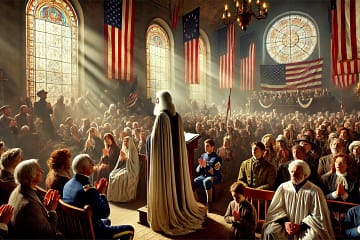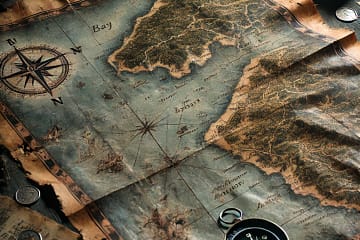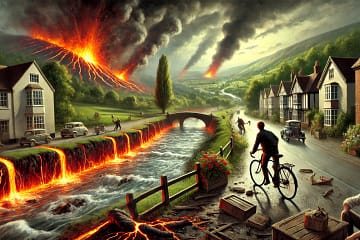Fahrenheit 451 and 1984 are two books that needs no introduction, but Fahrenheit 451 definitely needed one. Fahrenheit 451 directly teleports the readers into the world of Guy Montag without informing them what they are getting into. A one page prologue about the futuristic society could have saved the readers from thinking that its another novel about a dystopian world order where freedom of thought is banned and persecuted by law.
Fahrenheit 451, written by Ray Bradbury, was published in 1953. 1984, written by Goerge Orwell, was published in 1949. Both the books came out less than a decade after the termination of WWI, are set in dystopian worlds with high technological advancements, and ventures around the life of a middle aged man getting tired of the new world order. But that’s where the comparison stops and the story begins.
Fahrenheit 451 Firemen: Men who start fires...
Have you ever wondered why it’s called a firetruck when its full of water? Ray Bradbury probably gave it a thought and ensured that in his world firemen stayed true to their name and have fire in their arsenal. Guy Montag never truly cared about his profession till he started chatting with a sweet young curious child who informed him that once upon a time firemen fought the fire instead of flaming it. Montag was a middle aged nonchalant man who lived a simple married life. He dowsed books and houses with kerosene, watched them blaze in the dark night and then repeated this the next day. His wife lived in their fireproof house, watching the equivalent of futuristic TV, listening to podcasts with her airpods and popping pills to get a sound sleep. It was all normal societal behaviour. One day she popped a full bottle, got saved by the advancement of medical science and then simply continued her normal life.
Guy Montag continued his conversations with his new neighbour, curious Calrisse. These conversations gave the readers some idea about the advanced world that Montag lived in. Superfast cars (called jets), fireproof houses (making the original role of firemen redundant), rise of TVs, new modes of advertisements, etc. In other news a new world war was brewing and Montag was having an existential crisis. The disappearance of Clarise did no help in assuaging Montag about his loveless marriage, monotonous job and fear of the hound – a mechanical dog that can trace and tear any human being on directions of the firemen.
The only thrill in Montag’s life was stealing, saving, keeping a book or two, every time he burnt a pile of them. When a lady burned to death with her loving books, Montag couldn’t take it anymore. He did what every person with a job does in this position, take a day off. His boss, Captain Beatty, did what every boss does when his employee takes an unapproved leave. Captain Beatty showed up at Montag’s door and had a heart to heart with him. This is the moment where Fahrenheit 451 takes a different route than Orwellian 1984. Captain Beatty drops a bombshell over Montag with a quick history lesson.
Books were read and understood by a few. Then came the movies, TV shows, blogs, articles which summarized the books. The knowledge of existence of different conflicting ideas spread rapidly and sooner or later people were bound to be offended and so they did. A society is a huge collection of small groups (minorities) and for a society to function every group has to be satiated. Greater the spread of the idea, greater the resistance. This is what happened with books. It started with a few books being banned and burned, and this idea of killing the characters that never lived spread like wildfire. Happiness Boys (firemen) were given the charge of keeping everyone happy and they did the best they could. Burning the books was not a mandate by the big government, but the mandate of the people.
Books don't burn at Fahrenheit 451, Books burn with passage of time...
Captain Beatty left leaving the hound creeping at Montag’s door. It was a reminder that Montag has less than 24 hours to incinerate the book(s) he had stolen. Montag did what any man who has overstayed his welcome in the system does, he started reading the books and roped in Mildred, the wife, in this extreme sport as well. The world already had two nuclear wars after 2022, another one was waiting on the horizon and Montag knew the end was near.
Later that day Montag remembered an old English professor (being an ex-English professor is like being an ex-convict). He tracked him down and conferred his newfound enthusiasm of preserving books with him. Montag insisted on creating a copy of the last Bible on the planet (it could have been any book but mentioning a religious text always brings a following). Faber, the ex-English professor, saw his youth coming back. Faber knew an old guy with an old printing press who could get the job done. He gave Montag a two way earpiece, self-engineered by Faber, and asked the fireman to meet him the next day with monetary resources. After a book reading session Montag left to complete his last assignment.
Mildred, unbeknownst to Montag, had other plans but these ideas could wait. Mildred had a kitty party planned the same day and wanted Montag to behave himself. Montag, being a man, couldn’t prevent his burning desire to share the vast resource of knowledge and understanding he has come across with Mildred’s friends, who didn’t take it in the spirit Montag had wanted. This repulsive behaviour was allowed (this is not 1984) but harbouring a book was nothing less than a crime. On Faber’s advice Montag had reluctantly incinerated the book he showed to Mildred’s friends in front of them but the damage was done. Thinking all is well Montag wore his Salamander uniform and went to work, ready to burn more books as long as he could save one.
Fire burns brighter in the darkness...
The same day when Montag was asked to accompany the firemen on a special mission, he didn’t suspect anything. But when Montag, standing in front of his house with Captain Beatty, saw Mildred catching a taxi he knew his fate was burnt. He had discussed the idea of using firemens’ houses to conceal books with Faber but all that was in vain. As this was a special mission, Montag was given the opportunity to do his job one last time before he is imprisoned. Montag used the flamethrower to alight his house, his possessions and his beloved books (whose new secret location was revealed to firemen by Mildred).
But Captain Beatty wasn’t done with Montag yet. He had to ridicule him. Words sting more painfully than any slap. Nonetheless a slap seemed optimum for the moment. This slap ousted the two way earpiece from Montag’s ear and burnt Faber’s cover. In a moment of clarity or madness, Montag turned the flamethrower on Captain Beatty leaving him crisp. The hound leapt on Montag, bit/injected him in the leg and got the same treatment from Montag as Captain Beatty. Not knowing what to do, where to go, whom to confide in, Montag went back to his house, saved four book and ran to Faber’s house.
He took a pitstop at a fireman’s house and left the books there. He knew the house will burn and the house did burn the same night, with Montag watching it on TV in Faber’s house. The chase was now a live TV show and people were glued to their TVs. Faber advised Montag to follow the old railway tracks at the outskirt of the city. He provided him with old clothes, whiskey and hope of survival. Montag ran, following the chase on open TVs. He reached the tracks, then the river, showered with whiskey, threw his clothes in the river and took a leap of faith. The hound followed Montag’s old scent along the flow of river to nowhere. The audience demanded a befitting ending and they got it when a poor soul, to be masqueraded as Guy Montag, was captured by the hound.
In the meantime Montag had swam across the river, met with fellow outcasts and viewed the end of the chase. The outcasts were book readers who were left alone as they did nothing to question the state. They didn’t have books on them. Every person was equivalent to a book they had read and that made their life important to themselves. As everyone saw the war starting, bombs flattening the city and rubble forming the new skyline, Montag reminisced about Mildred (fate unknown), Clarisse (death by speeding vehicle), Faber (fate unknown) and his old simpler life.
The burning question: Why compare Fahrenheit 451 to 1984?
If you have read 1984 and then either Fahrenheit 451 or this book summary of Fahrenheit, you would think it’s a folly to compare the two. And you are absolutely right. Although Fahrenheit 451 is on similar dystopian lines as 1984, they both have very different endings. Unlike 1984, which delves into a chaotic peaceful future controlled by the system, Fahrenheit 451 is more about freedom than oppression. While 1984’s world is designed by the few in power, Fahrenheit 451’s world is a reflection of choices that people made in the past.
Whilst refraining from directly commenting on 1984’s ending, one would realize that Fahrenheit 451’s is far more optimistic. This is not a book about importance of books, but the sheer irrelevance of them. This message is conveyed to the readers by the outcasts when they told Montag that even when books were in abundance, the masses weren’t learning from them. The messages of books remained within the books. Now when the books have been made redundant, the messages of the books still remain within the books and the masses have gone on with their lives.
If you haven’t read Fahrenheit 451 yet, get it on Amazon by clicking on this text.
If you haven’t read 1984, do NOT get it on Amazon by clicking on this text here.
Note: In case you are looking for a Product Management course, I would highly recommend joining this cohort-based course – ISB Executive Education – Product Management program
PS: You can connect with me for review or referral discount (link for referral discount)


